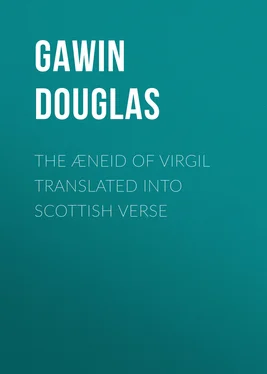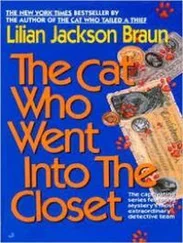Gawin Douglas - The Æneid of Virgil Translated Into Scottish Verse
Здесь есть возможность читать онлайн «Gawin Douglas - The Æneid of Virgil Translated Into Scottish Verse» — ознакомительный отрывок электронной книги совершенно бесплатно, а после прочтения отрывка купить полную версию. В некоторых случаях можно слушать аудио, скачать через торрент в формате fb2 и присутствует краткое содержание. Жанр: foreign_poetry, Поэзия, foreign_antique, foreign_prose, на английском языке. Описание произведения, (предисловие) а так же отзывы посетителей доступны на портале библиотеки ЛибКат.
- Название:The Æneid of Virgil Translated Into Scottish Verse
- Автор:
- Жанр:
- Год:неизвестен
- ISBN:нет данных
- Рейтинг книги:4 / 5. Голосов: 1
-
Избранное:Добавить в избранное
- Отзывы:
-
Ваша оценка:
- 80
- 1
- 2
- 3
- 4
- 5
The Æneid of Virgil Translated Into Scottish Verse: краткое содержание, описание и аннотация
Предлагаем к чтению аннотацию, описание, краткое содержание или предисловие (зависит от того, что написал сам автор книги «The Æneid of Virgil Translated Into Scottish Verse»). Если вы не нашли необходимую информацию о книге — напишите в комментариях, мы постараемся отыскать её.
The Æneid of Virgil Translated Into Scottish Verse — читать онлайн ознакомительный отрывок
Ниже представлен текст книги, разбитый по страницам. Система сохранения места последней прочитанной страницы, позволяет с удобством читать онлайн бесплатно книгу «The Æneid of Virgil Translated Into Scottish Verse», без необходимости каждый раз заново искать на чём Вы остановились. Поставьте закладку, и сможете в любой момент перейти на страницу, на которой закончили чтение.
Интервал:
Закладка:
THE PROLOUG OF THE FERD BUKE
With bemys scheyn thou bricht Cytherea,
Quhilk only schaddowist amang starris lyte,
And thi blyndyt weyngit son Cupyd, ȝe twa
Fosteraris of byrnyng, carnail, hait delyte,
Ȝour joly wo neidlyngis most I endyte,
Begynyng with a fenȝeit faynt plesance,
Continewit in lust, and endyt with pennance.
In fragil flesch ȝour fykkil seyd is saw,
Rutyt in delyte, welth, and fude delicate,
Nurist with sleuth and mony onsemly saw;
Quhar schame is lost, thar spredis ȝour burgeonys hait;
Oft to revolue ane onleful consait
Rypys ȝour peralus frutis and oncorn:
Of wikkyt grayn quhou sal gude schaif be schorn?
Quhat is ȝour fors bot feblyng of the strenth?
Ȝour curyus thochtis quhat but musardry?
Ȝour fremmyt glaidnes lestis not ane howris lenth;
Ȝour sport for schame ȝe dar not specify;
Ȝour frute is bot onfructuus fantasy;
Ȝour fary joys beyn bot janglyng and japys,
And ȝour trew seruandis sylly goddys apys.
Ȝour sweit myrthis ar mixt with byttyrnes;
Quhat is ȝour drery gemme? a myrry pane;
Ȝour wark onthrift, ȝour quyet is restles,
Ȝour lust lykyng in langour to remane,
Frendschip turment, ȝour traist is bot a trane:
O luf, quhidder art thou joy or fulychnes,
That makis folk sa glaid of thar distres?
Salomonys wyt, Sampson thou rubbist hys fors,
And Dauid thou byreft hys prophecy;
Men says thou brydillyt Aristotyll as ane hors,
And crelyt vp the flour of poetry:
Quhat sal I of thi myghtis notyfy?
Fair weil, quhar that thy lusty dart assalis,
Wyt, strenth, ryches, na thyng bot grace avalis.
Thou cheyn of luf, ha benedicite!
Quhou hard strenys thi bandis euery wyght!
The god abuf, from his hie maieste,
With the ybond, law in a maid dyd lycht;
Thou venquyst the strang gyant of gret mycht;
Thou art mair forcy than the ded sa fell;
Thou plenyst paradyce, and thou heryt hell.
Thou makist febill wight, and lawyst the hie;
Thou knyttis frendschyp quhar thar beyn na parage;
Thou Jonathas confederat with Davy;
Thou dantyt Alexander for all his vaslalage;
Thou festnyt Jacob fourteyn ȝheir in bondage;
Thou techit Hercules go lern to spyn,
Reke Dyomeir hys mays and lyoun skyn.
For luf Narsysus perysyt at the well;
For luf thou stervyst most douchty Achill;
Thesyus, for luf, hys fallow socht to hell;
The snaw quhyte dow oft to the gray maik will.
Allace! for luf how mony thame self dyd spill!
Thy fury, luf, moderis taucht, for dispyte,
Fyle handis in blude of thar ȝong chyldering lyte.
O Lord, quhat writis myne author of thi fors,
In hys Georgikis! quhou thyne ondantyt myght
Constrenys so sum tyme the stonyt hors
That, by the sent of a meyr far of syght,
He bradis brays onon, and takis the flyght;
Na brydill may hym dant nor bustuus dynt,
Nowther bra, hie roch, nor brayd fludis stynt.
The bustuus bullys oft, for the ȝong ky,
With horn to horn wyrkis othir mony a wound,
So rumysyng with hydduus lowand cry
The feildis all doith of thar rowstis resound:
The meyk hartis, in bellyng, oft ar fond
Mak fers bargane, and rammys togyddir ryn;
Baris twyte thar tuskis, and fret otheris skyn.
The reuthtfull smart and lamentabill cace
Quhilk thar he writis of Leander ȝyng,
Quhou for thi luf, Hero, allace, allace!
In fervent flambe of hait desyre byrnyng,
By nychtis tyde, the hevynys lowd thundering,
And, all with storm trublyt, the seys flude
Bettand on the rolkis, and rowtand as it war wod;
Set he hym not to swym our, wallaway!
The fyrth betwix Sestos and Abydane,
In Europe and in Asya citeis tway;
Hys fader and moder mycht hym not call agane:
O God, quhat harm! thar wes he drynt and slane;
And quhen his lufe saw this myscheif, atanys
Out our the wall scho lap, and brak hir banys.
Lo, quhou Venus kan hir seruandis acquyte!
Lo, quhou hir passionys onbridillis al thar wyt!
Lo, quhou thai tyne thame self for schort delyte!
Lo, from all grace quhou to myscheif thai flyt,
Fra weil to sturt, fra payn to ded! and ȝyt
Thar beyn bot few exempil takis of othir,
Bot wilfully fallys in the fyre, leif brothir.
Be nevir our set, myne author techis so,
With lust of wyne nor warkis veneryane;
Thai febill the strenth; revelys secrete bath two
Stryfe and debait engendris, and feil hes slane;
Honeste, prowes, dreid, schame and luk ar gane
Quhar thai habound; attempyr thame for thy.
Childir to engendir oys Venus, and not invane;
Hant na surfat, drynk bot quhen thou art dry.
Quhat? is this lufe, nys luffaris, at ȝe meyn,
Or fals dissait fair ladeys to begile?
Thame to defowle, and schent ȝour self betweyn,
Is al ȝour lykyng, with mony suttel wyle.
Is that trew lufe, gude faith and fame to fyle?
Gyf luf be vertu, than is it lefull thing;
Gif it be vyce, it is ȝour ondoyng.
Lust is na lufe, thocht ledis lyke it weill;
This furyus flambe of sensualite
Ar nane amouris bot fantasy ȝe feill:
Carnale plesance, but syght of honeste,
Hatis hym self forsuyth, and luffis nocht the:
Thare beyn twa luffis, perfyte and imperfyte,
That ane leful, the tother fowle delyte.
Lufe is a kyndly passioun, engendryt of heyt
Kyndlyt in the hart, ourspredyng al the cors:
And, as thou seys sum person waik in spreyt,
Sum hait byrnyng as ane onbridillyt hors;
Lyke as the pacient hes heyt of our gret fors,
And in ȝong babbys warmnes insufficient,
And into agyt failȝeis, and is out quent;
Rycht so in luf thou may be excessyve,
Inordinatly luffand ony creature;
Thi luf alsso it may be defectyve,
To luf thine awin and geif of otheris na cure:
Bot quhar that lufe is rewlyt by messure,
It may be lyknyt to ane hail mannis estait,
In temperat warmnes, nowthir to cald nor hait.
Than is thi lufe inordinat, say I,
Quhen ony creatur mair than God thou luffis,
Or ȝit luffis ony to that fyne, quharby
Thi self or thame thou frawartis God remufis:
Fortil attempir thine amouris the behuffis:
Lufe euery wyght for God, and to gude end,
Thame be na wys to harm, bot to amend.
That is to knaw, lufe God for his gudnes,
With hart, hail mynde, trew servyce, day and nycht;
Nixt luf thi self, eschewand wykkytnes;
Lufe syne thi nychtburris, and wyrk thame nane onrycht,
Willyng at thou and thai may haue the syght
Of hevynnys blys, and tyste thame not tharfra,
For, and thou do, syk luf dowe nocht a stra.
Faynt lufe, but grace, for all thi fenȝeit layis,
Thy wantoun willis ar verray vanyte;
Grasles thou askis grace, and thus thou prayis;
Haue mercy, lady, haue reuth and sum piete!
And scho, reuthtles, agane rewys on the:
Heir is na paramouris fund, bot all haitrent,
Quhar nowthir to weill nor resson tak thai tent.
Callys thou that reutht, quhilk of thar self ne rakkis?
Or is it grace to fall fra grace? nay, nay;
Thou sekis mercy, and tharof myscheif makkis:
Renown and honour quhy wald thou dryfe away?
A brutale appetyte makis ȝong fulys forvay,
Quhilk be resson lyst not thar heyt refreyn,
Haldand opynyon deyr of a boryt beyn.
Интервал:
Закладка:
Похожие книги на «The Æneid of Virgil Translated Into Scottish Verse»
Представляем Вашему вниманию похожие книги на «The Æneid of Virgil Translated Into Scottish Verse» списком для выбора. Мы отобрали схожую по названию и смыслу литературу в надежде предоставить читателям больше вариантов отыскать новые, интересные, ещё непрочитанные произведения.
Обсуждение, отзывы о книге «The Æneid of Virgil Translated Into Scottish Verse» и просто собственные мнения читателей. Оставьте ваши комментарии, напишите, что Вы думаете о произведении, его смысле или главных героях. Укажите что конкретно понравилось, а что нет, и почему Вы так считаете.












